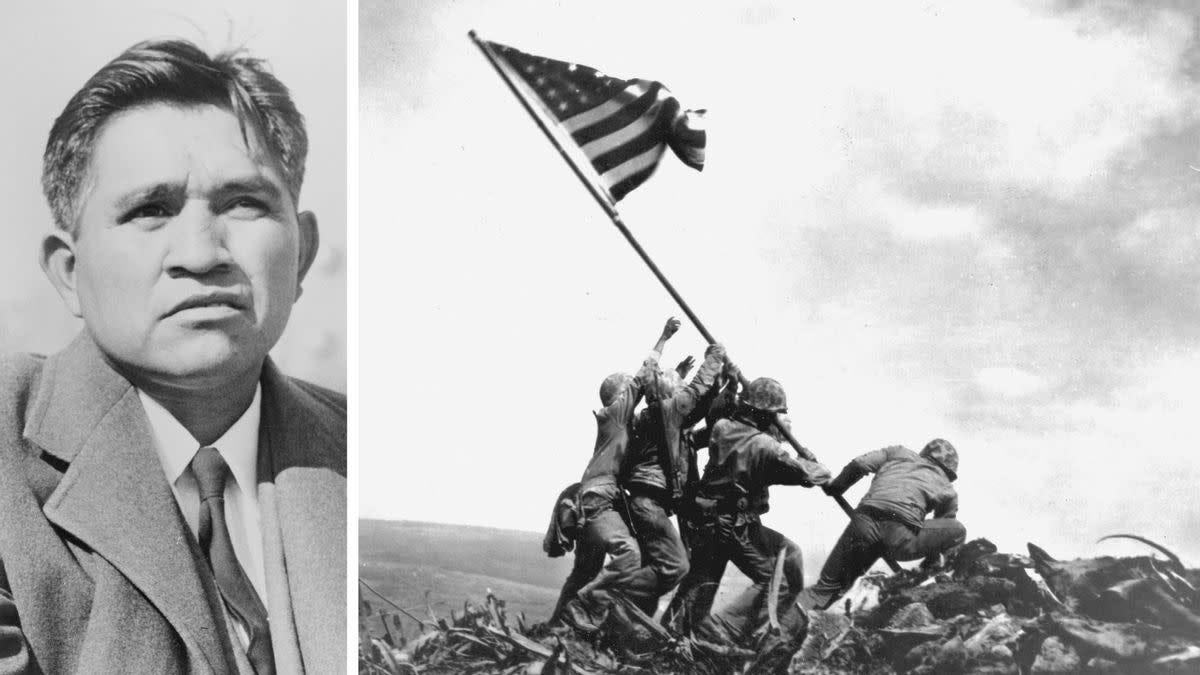
I never learned about Ira Hayes in school.
But in the sixties I was a big folk music fan. It was in that environment that I first heard a song by the late Cisco Houston, a traveling pal of the great Woody Guthrie. Ira Hayes was written by a Native American, Peter LaFarge.
Gather 'round me people
There's a story I would tell
'Bout a brave young Indian
You should remember well
From the land of the Pima Indian
A proud and noble band
Who farmed the Phoenix Valley
In Arizona land
Down the ditches a thousand years
The waters grew Ira's peoples' crops
'Til the white man stole their water rights
And the sparkling water stopped
Now, Ira's folks were hungry
And their land grew crops of weeds
When war came, Ira volunteered
And forgot the white man's greed
Call him drunken Ira Hayes
He won't answer anymore
Not the whiskey drinking Indian
Or the marine that went to war
Kris Kristofferson and Johnny Cash have also recorded the song.
But it’s Ira Hayes I’m writing about today.
Although you wouldn’t have learned about him in history class, there was a web page at the Department of Defense dedicated to him, along with the Navajo Code Talkers and Jackie Robinson.
Until last week.
As part of the Trump purge of any mention of diversity, equity or inclusion, the stories of Jackie Robinson, the Navajo Code Talkers and Ira Hayes, the hero of Iwo Jima, were scrubbed from the Defense Department web pages.
The Washington Post:
Defense Secretary Pete Hegseth has vigorously supported an executive order that Trump issued on his first day in office banning DEI from federal government programs and contracts, which he claimed were “immoral” and wasteful. In a memo last month, a senior Hegseth aide announced a “digital content refresh,” requiring officials to take “all practicable steps” to remove articles and other media that “promote Diversity, Equity and Inclusion” from the department’s website and social media accounts.
The famous photograph by Associated Press photographer, Joe Rosenthal, titled Raising of the Flag on Iwo Jima soon became a symbol of the American victory in the fight against fascism.
Corporal Ira Hayes was hailed as a national hero.
Following the war, Ira Hayes made many public appearances and was revered by the public for his service in the war. Even with all the distinctions and recognitions, he was given Private Hayes was never felt comfortable in the spotlight and did not feel that he should be honored above any of his fallen brothers in arms.
On November 10, 1954, the United States Marine Corps War Memorial was unveiled at a special dedication ceremony in our nation’s capital. The then-president of the United States, President Dwight D. Eisenhower recognized and praised the then 32-year-old Pima Marine for his service and dubbed him “a national war hero.”
Tragically, like many of our nation’s veterans, Ira Hamilton Hayes was greatly troubled by the events of the war and was stricken with Post Traumatic Stress Disorder and survivor’s guilt. The treatment of his people weighed heavily on him. Just ten short weeks after the dedication ceremony of the United States Marine Corps War Memorial, Ira passed away near his home in Sacaton, Arizona at the age of 32.
That is the story the Defense Department scrubbed from its web site.
However there was strong and immediate push back and the Defense Department said they would reverse the erasure.
Yet, they were unapologetic.
A statement from Pentagon Press Secretary John Ullyot:
As Secretary Hegseth has said, DEI is dead at the Defense Department. Discriminatory Equity Ideology is a form of Woke cultural Marxism that has no place in our military. It Divides the force, Erodes unit cohesion and Interferes with the services' core warfighting mission. We are pleased by the rapid compliance across the Department with the directive removing DEI content from all platforms. In the rare cases that content is removed -- either deliberately or by mistake -- that is out of the clearly outlined scope of the directive, we instruct the components and they correct the content accordingly.



